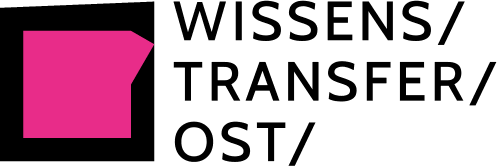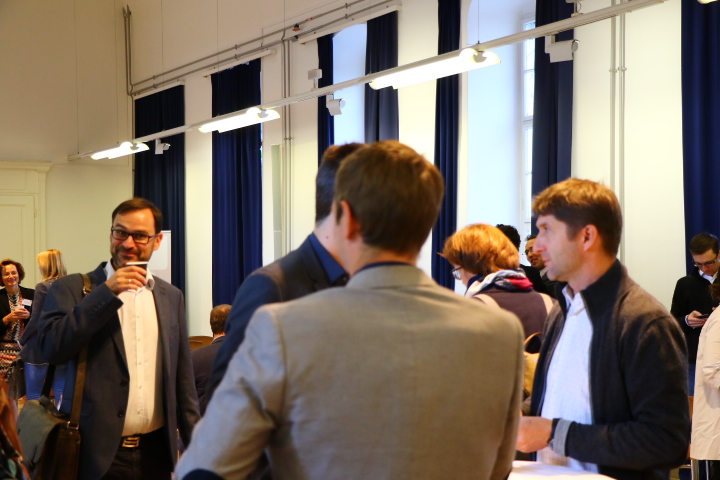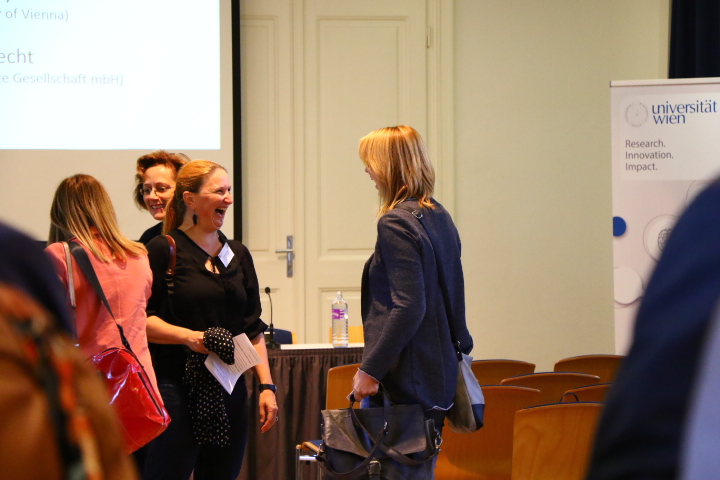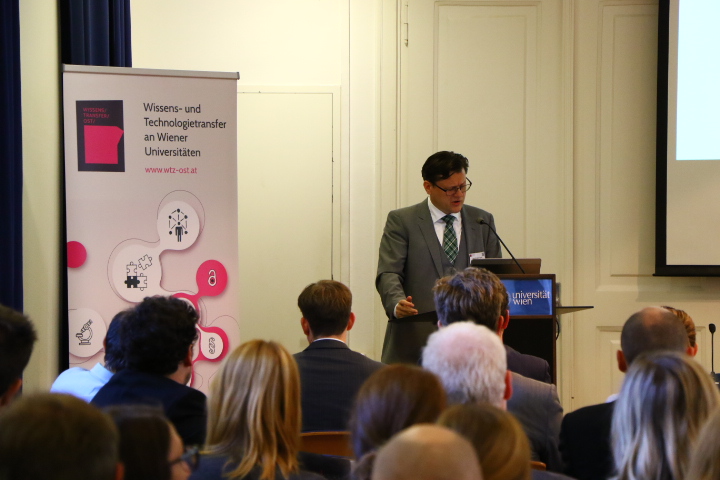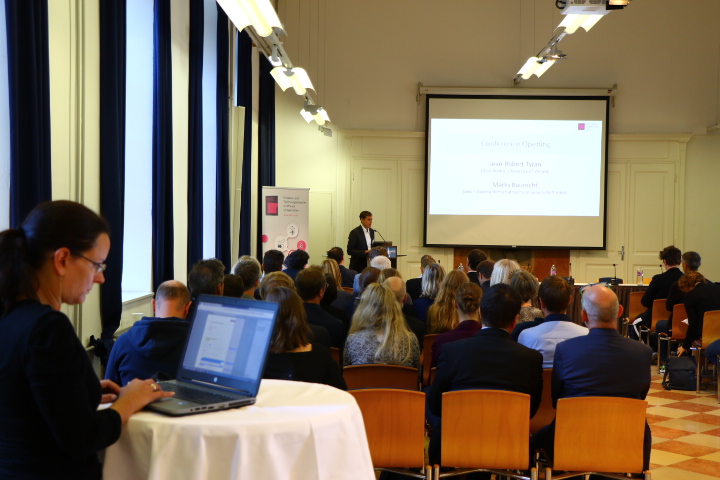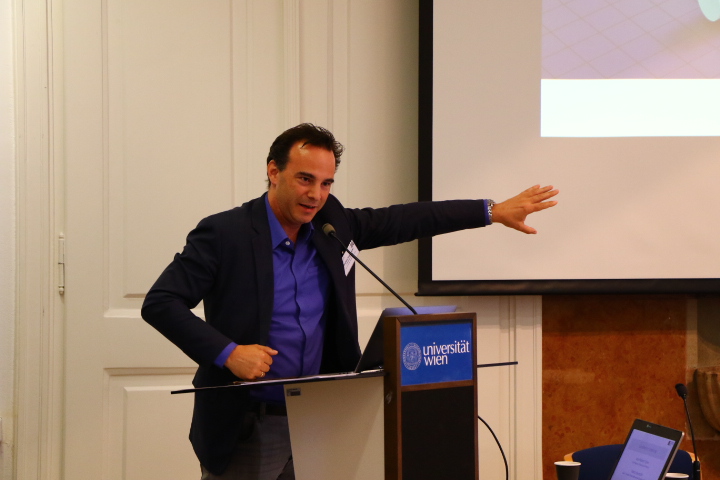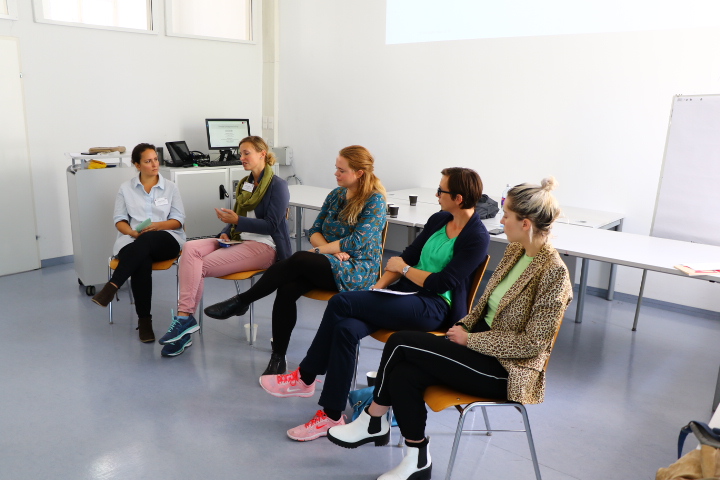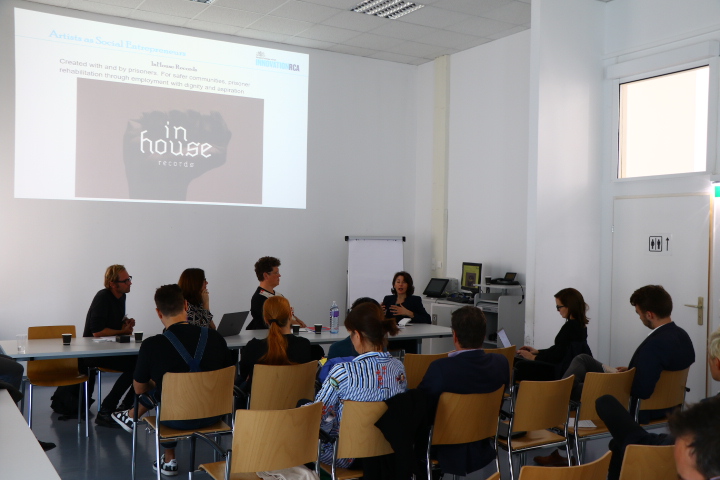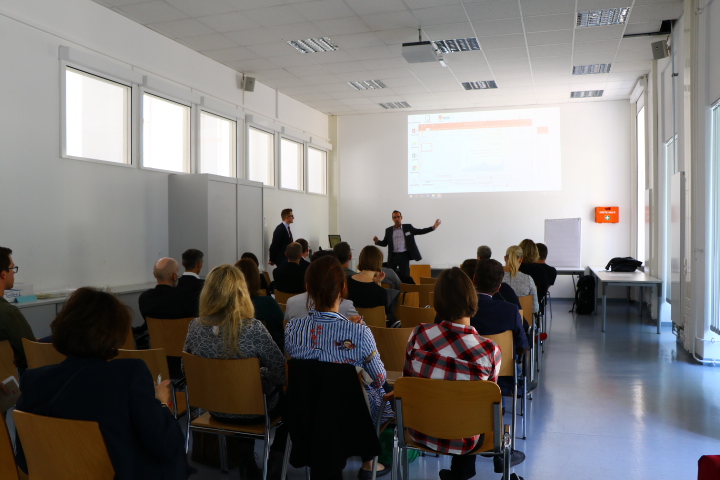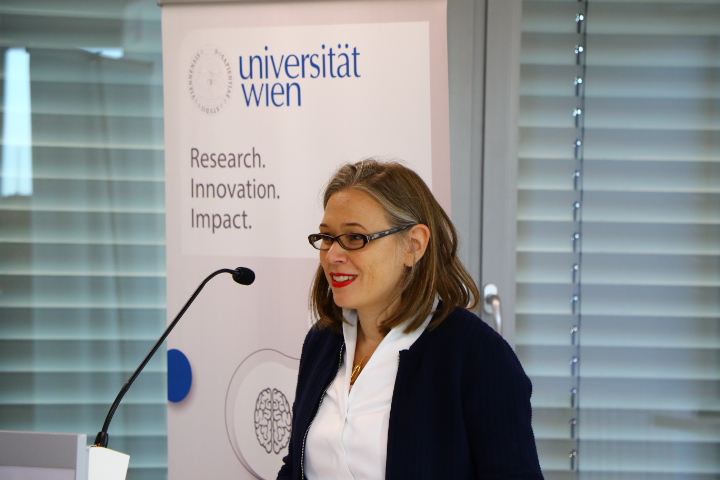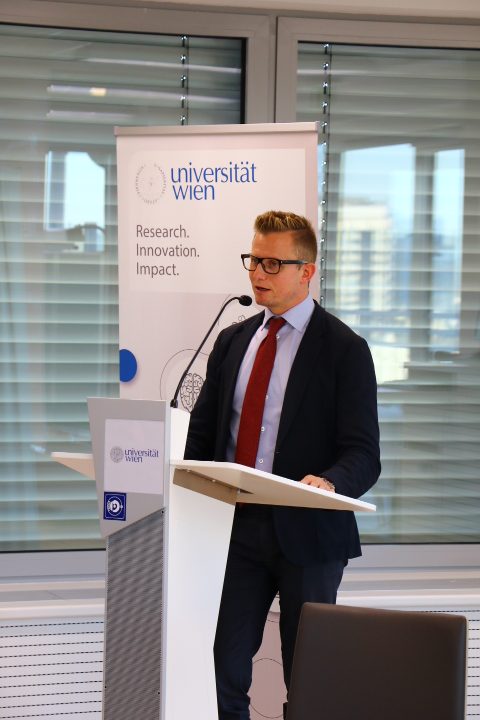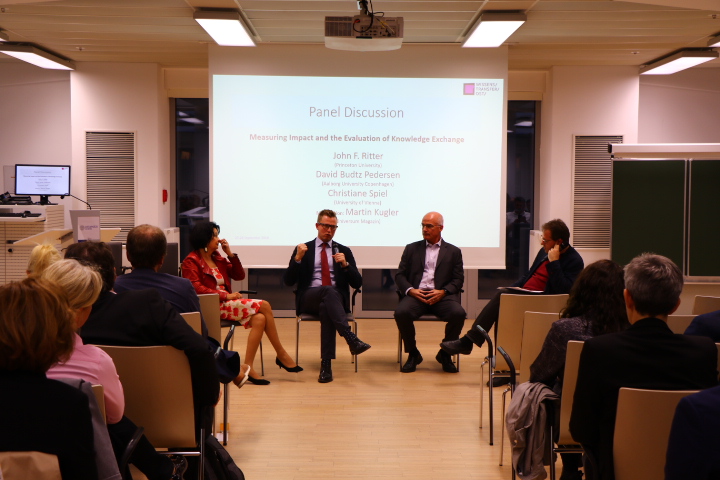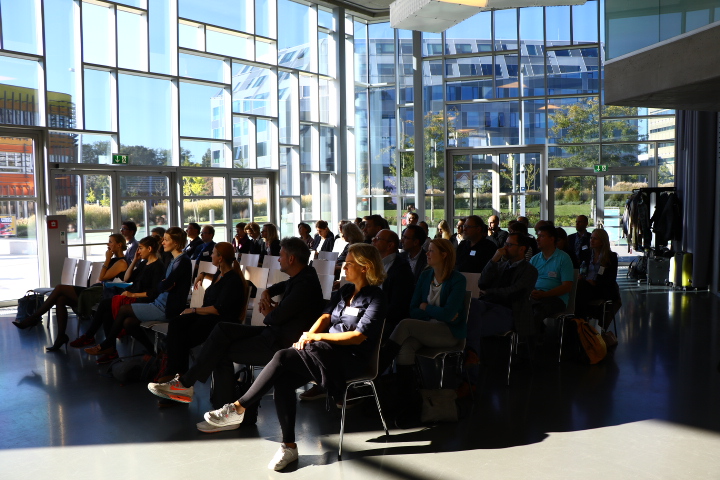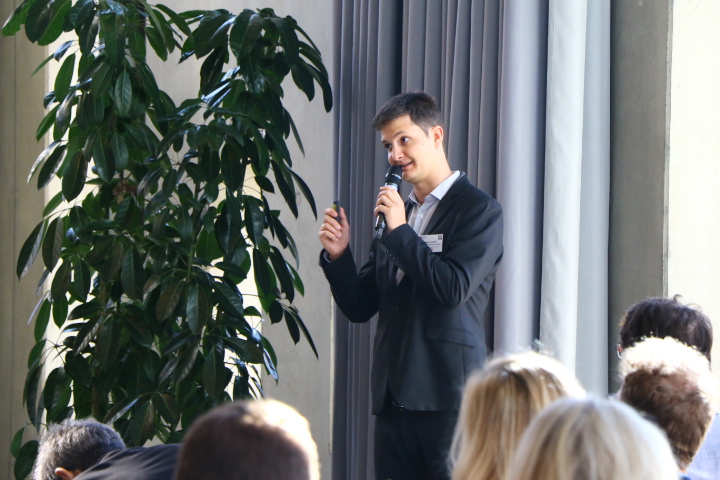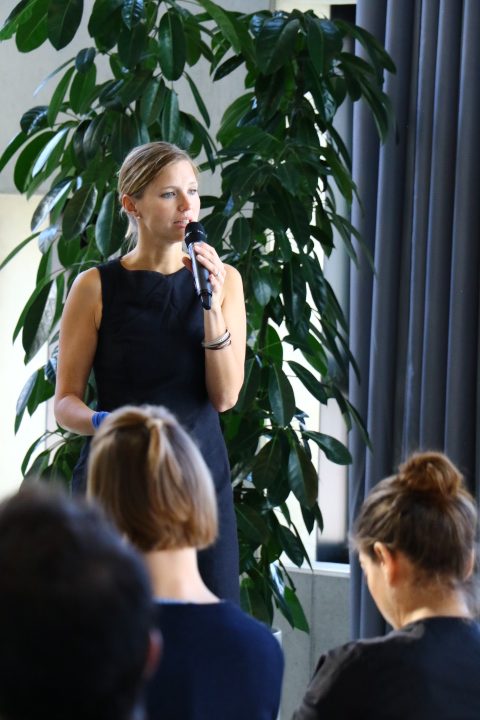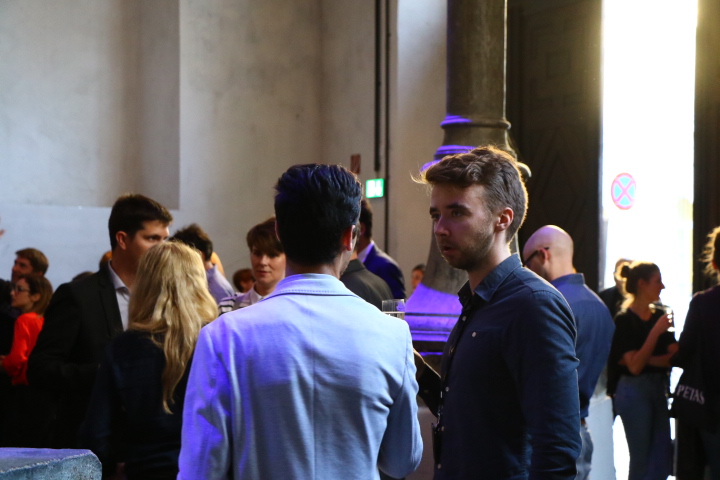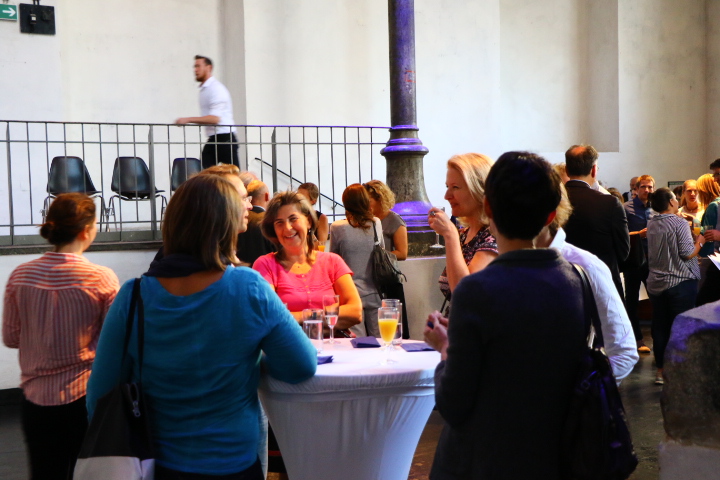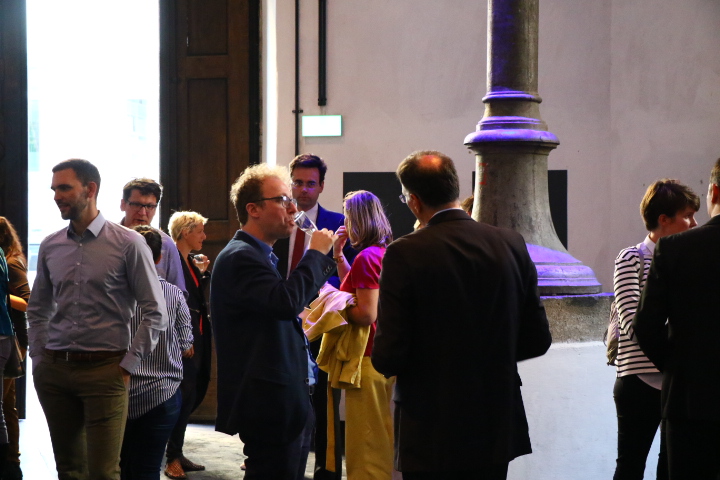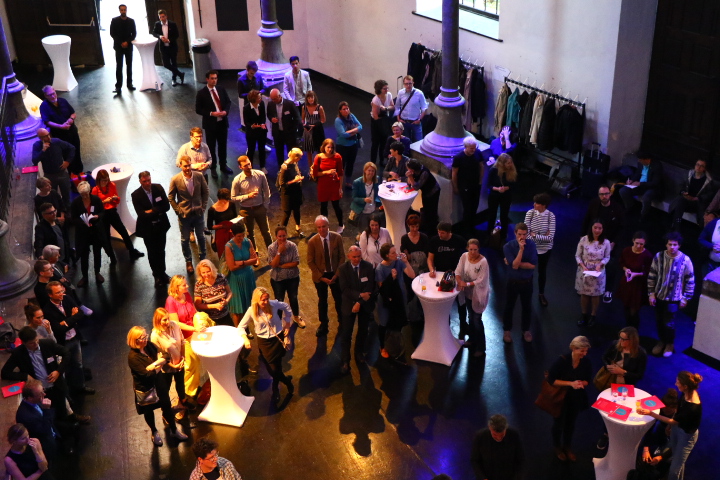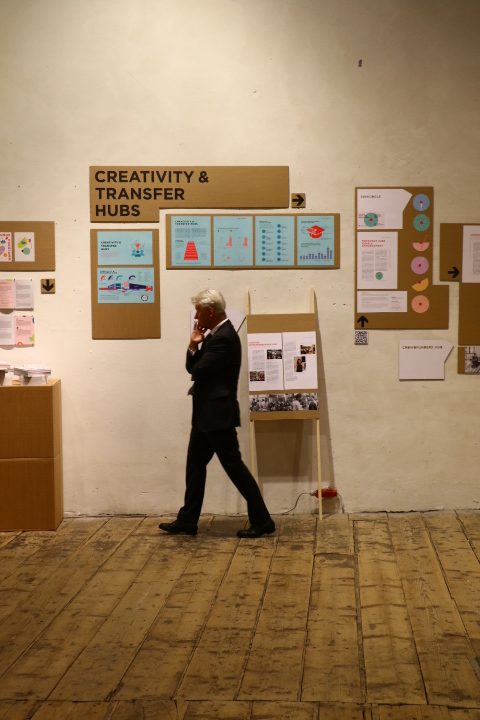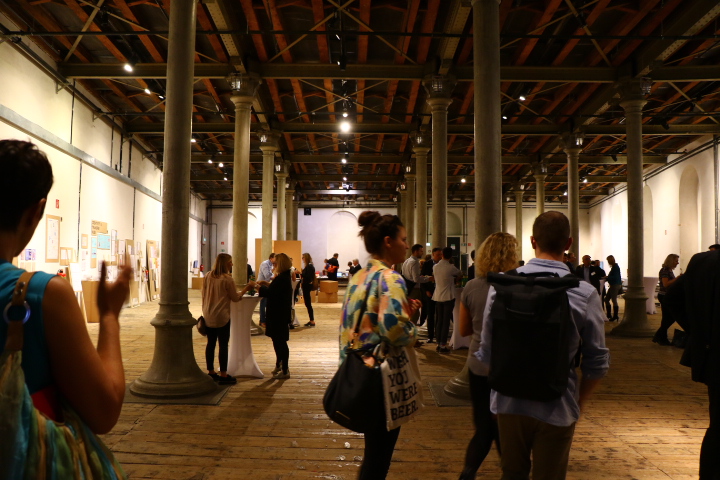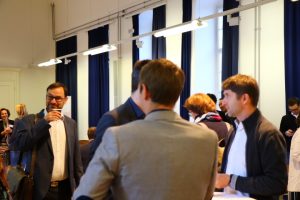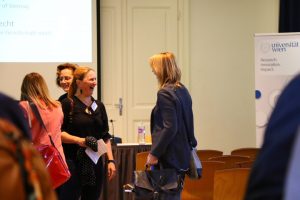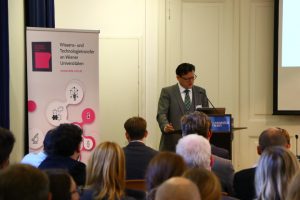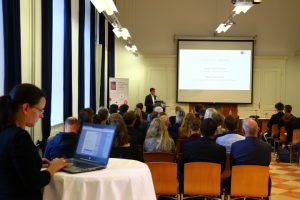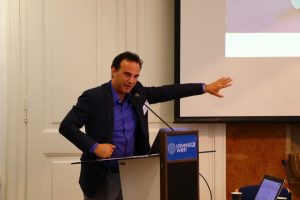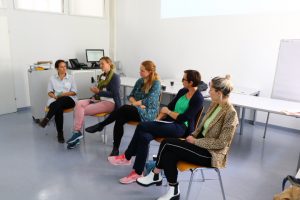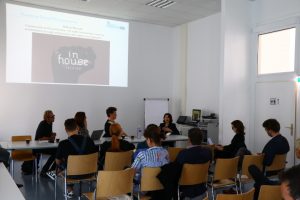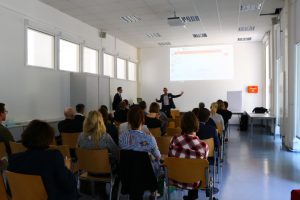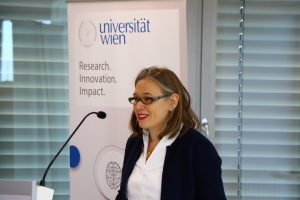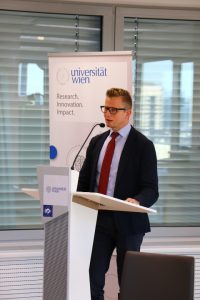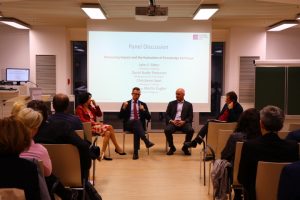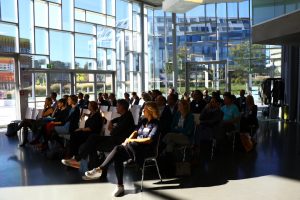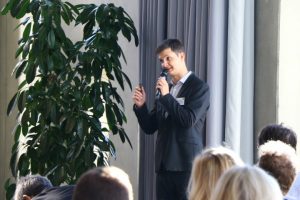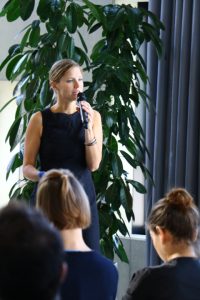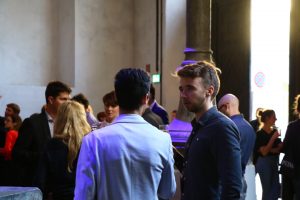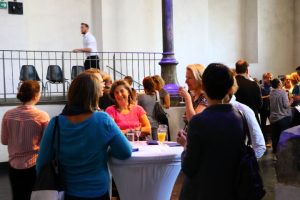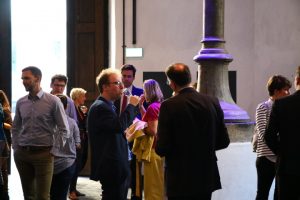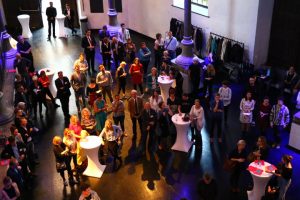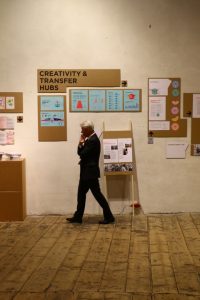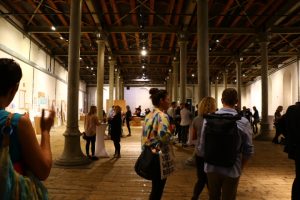This conference aims to reflect on the current and future international trends in the broad field of knowledge exchange and technology transfer. The conference is organised by the Knowledge Transfer Center East, a cooperation project by nine Viennese Universities. This project fosters and promotes all aspects of knowledge and technology transfer, including the social sciences, humanities, and the arts. For more information visit wtz-ost.at.
Against the background of the outcomes of this project, the conference will bring together international and regional experts to discuss best practices in knowledge and technology transfer.
The target audience are knowledge exchange professionals. Participation in the conference will be free of charge.
The conference is fully booked! If you wish to be put on the waiting list, please contact conference@wtz-ost.at.
Download the Conference Summary here.
Day 1 – Thursday, 27 September
Campus of the University of Vienna, Spitalgasse 2, 1090 Vienna
| Aula | Seminarraum 1 | Seminarraum 2 | |
| 09:00-09:30 | Registration | ||
| 09:30-09:40 | Welcome Jean-Robert Tyran (Vice Rector, University of Vienna) | ||
| 09:40-09:50 | Opening Marlis Baurecht (AWS) | ||
| 09:50-10:30 | Keynote Markus Aspelmeyer (University of Vienna) | ||
| 10:30-12:00 | Funding & Financing Programms for Spin-Offs | Female Entrepreneurship | On Arts Incubators & Cultural Accelerators |
| 12:00-13:00 | Lunchbreak | ||
| 13:00-14:30 | University in-house Incubators: Pros/Cons | Knowledge Exchange in Social Sciences & Humanities | Teaching, Learning & Training |
| 14:30-15:00 | Coffee Break | ||
| 15:00-16:30 | Going beyond Publications – Success Factors for Technology Transfer | Public Engagement & Citizen Science | Open Innovation |
| 16:30-17:30 | Break/Transfer |
Conference Opening Event – Thursday, 27 September
Oskar-Morgenstern-Platz 1, 1090 Vienna
| Sky Lounge | |||
| 17:45-18:00 | Welcome Michaela Fritz (Vice Rector, Medical University of Vienna) | ||
| 18:00-18:30 | Keynote David Budtz Pedersen (Aalborg University Copenhagen) | ||
| 18:30-18:45 | Presentation Christiane Spiel (University of Vienna) | ||
| 18:45-19:15 | Panel Discussion John F. Ritter (Princeton University), David Budtz Pedersen (Aalborg University Copenhagen), Christiane Spiel (University of Vienna), Moderation: Martin Kugler (Universum Magazin) | ||
| 19:15-21:00 | Get-together, Dinner & Drinks | ||
Day 2 – Friday, 28 September
Vienna University of Economics and Business, Welthandelsplatz 1, 1020 Vienna
| EA | |
| 09:30-10:30 | Keynote Stephanie Birkner (Universität Oldenburg) |
| Sitzungssaal 1 | Sitzungssaal 6 | TC-Hall | |
| 10:30-12:00 | Open Knowledge Transfer & Society | Technologytransfer and SDGs – No Contradiction | Artistic Impact – Response, Exchange and Understanding |
| 12:00-13:00 | Lunchbreak (Book Launch: alt narratives – Cinematic Communication of Scientific Research) | ||
| 13:00-14:15 | Working with Industry | Gender in Third Mission & Knowledge Transfer of Universities | Entrepreneurship Education for Scientists 1 |
| 14:15-14:30 | Break | ||
| 14:30-16:00 | Creative Entrepreneurship for Arts & Design: Strategies and Perspectives | Engagement With Public Policy (Session cancelled) | Entrepreneurship Education for Scientists 2 |
| 16:00-17:00 | Break/Transfer |
Conference Closing Event – Friday, 28 September
Atelierhaus der Akademie der bildenden Künste Wien, Lehargasse 6-8, 1060 Vienna
| Atelierhaus | |||
| 17:00-18:00 | Book Launch „Wissenstransfer gestalten“ | ||
| 18:00-18:20 | Opening Eva Blimlinger (President UNIKO), Elmar Pichl (Austrian Federal Ministry of Education, Science and Research) | ||
| 18:20-18:30 | Introduction Andrea Braidt (Vice Rector, Academy of Fine Arts Vienna), Georg Russegger (Academy of Fine Arts Vienna) | ||
| 18:30-18:45 | Concert / Show Cases / Exhibition Opening | ||
| 18:45-22:00 | Get-together, Dinner & Drinks | ||
Nurturing the Ivory Tower: The Role of Blue-Sky Research as Incubator for Deep-Tech Innovation
Markus Aspelmeyer, University of Vienna Fundamental, open-ended research (“blue-sky research”) is often considered incompatible with industrial applications. I argue for the contrary position. Fundamental research relies on pushing the boundaries of current technologies and thus serves as an inherent incubator for deep-tech innovations. The actual challenge lies in identifying industrial and society’s needs for the developed novel solutions.
Measuring Impact and the Evaluation of Knowledge Exchange
David Budtz Pedersen, Aalborg Univesity Denmark Although governments and research funding bodies have shown considerable interest in developing new frameworks for mapping the societal impact of research, there is still considerable uncertainty as to what constitutes robust indicators of impact. Using general indicators to measure societal impact is analytically wrong and often do not capture the multiplicity of impact pathways. Indeed, the contributions of science to society are so varied and mediated by so many factors, that indicators used in impact assessment cannot be universal. Instead, they need to be developed for given contexts and used alongside qualitative assessment. This presentation introduces key building blocks for designing Responsible Impact Assessments by allowing researchers and universities to have significant influence on how their impact is represented and communicated. Moving beyond simplistic indicators for publications or economic benefits, the talk outlines a new approach to assessing research impact and evaluating knowledge exchange.
Female Entrepreneurship
Stephanie Birkner, University of Oldenburg Prof. Dr. Stephanie Birkner (Junior Professor for Female Entrepreneurship at the Carl von Ossietzky University of Oldenburg, Germany) will showcase insights on why and how to foster female entrepreneurship. While acknowledging that female entrepreneurship research addresses a plethora of academic levels, has an interdisciplinary focus, and reflects on a wide range of methodological approaches, her keynote features an overview of academic findings and practical approaches to serve scientists, educators, professionals, and policy makers alike. To do so, the speech is motivated by the plea within discourses on female entrepreneurship to reflect on the importance of and differences in sex and gender analysis in entrepreneurship research (1) to offer a portfolio of research attempts addressing current challenges and future perspectives of research on female entrepreneurship and (2) to provide contemporary references regarding questions of gendered entrepreneurship in education and (academic) transfer activities. Through this, the keynote aims to serve as an impulse to deepen the dialogue across scholarly, practical and political professions as well as to inform and build bridges between their actions in fostering female entrepreneurship.
Artistic Impact – Response, Exchange and Understanding
Airan Berg, Festival der Regionen Barbara Putz-Plecko, University of Applied Arts Vienna Barbara Imhof, LIQUIFER Systems Group Impact as a term is trapped in the sciences as a unit of measure of publication success on the one hand, and on the other hand one might think that the term together with the preceding word artistically results in a tautology. This session is about shaking things up anew and perhaps looking at them freshly, the relationships should be re-related. Therefore, we will challenge the connection of artistic and impact together and maybe find a model open and resonating helping to understand transformation anew. How can we redefine transfer as a link and intensify the complementary strengths, the creative power of art, the curiosity of science, to name but two, at the heart of the matter? The transfer of cognitive awareness into new and open contexts offers an opportunity. The connections between Barbara Imhof in the field of architecture and the broad field of biology and space science, Barbara Putz-Plecko in art education and institution building and Airan Berg in the area of theatre work and its possible alternative forms are extensions that can be understood as applied answers to some challenges existing. Paradigmatic opportunities need to be recognized, then they provide answers to questions that will be asked tomorrow, which is something we need to prepare for today.
Creative Entrepreneurship for Arts & Design: Strategies and Perspectives
Antti Leppilampi, XAMK Elisabeth Noever-Ginthör, Departure/Vienna Business Agency Antoinette Rhomberg, University of Applied Arts Vienna The importance of entrepreneurial knowledge has increased on a large scale throughout many disciplines. Also creatives and artists are becoming more aware of the advantages of entrepreneurial skills. Which role should the universities play in this context? By sharing experiences, best practices and the achievements of our experts the session addresses the implementation of creative entrepreneurship at Art and Design universities. Status quo, strategies and perspectives for successful and sustainable support by means of the universities will be discussed. Focusing on the differences to general entrepreneurship education, the session considers particular responses on the specific needs and challenges of entrepreneurial knowledge transfer in Arts & Design. How to support and implement creative entrepreneurship structures sustainably at the universities? At which stage of education should students be addressed? Where and how to embed the entrepreneurial and creative industries ecosystem in creative entrepreneurship education? The role of the particular ecosystems will be as well topic as the integration in existing structures.
Entrepreneurship Education for Scientists
Birgit Hofreiter, i2c TU Wien Harald Jenull, UnternehmerTUM Peter Keinz, Vienna University of Economics and Business Sara Matt-Leubner, University of Innsbruck There are many Entrepreneurship courses at universities for students at all levels. However, the so-called “Third Mission” aims to foster the entrepreneurial acitivites of all members and the founding of spin-offs. Spin-offs are start-ups with a direct link to the university – either with a university-owned patent or with shares. So universities are interested to educate scientists into entrepreneurs. Nevertheless, there is a big difference between science and business. So, what are successful strategies of universities to have more „Sciencepreneurship“? Experts from Munich, Vienna and Innsbruck are promoting their projects and success stories.
Female Entrepreneurship
Stephanie Birkner, Carl von Ossiektzy University Oldenburg Lisa Marie Fassl, Austrian Angel Investors Association Therese Kaiser, KATHE Konzeptbüro, Commercial Management Rrriot Festival, Business Riot Gabriele Tatzberger, Vienna Business Agency The numbers speak for themselves: Only 7,1% of Austrian start-ups are founded by women which is even beyond the European average of 14,8%. There are many buzzwords as reasons for this: Women don’t like to take risks, work-life balance is in danger especially when founding a family (or having plans to do so). One would need to change society at all to improve the above mentioned numbers but since this won’t be done from one day to another we firstly need to work on smaller-scaled programmes and projects. Many initiatives were arising in the past years, but how fruitful are they? There are two approaches in this field which could be also seen as one step after the other: On the one side there is the need to raise awareness for female entrepreneurship. On the other side female founders need clear support structures. Things change by being done: The more attractive the circumstances are, the more attractive the profession entrepreneur will become. There are already enough support structures for entrepreneurs – do they suffice for female entrepreneurs as well? Starting from their experiences, our speakers will discuss the importance of role models, networks and general support structures. Our guests will also share their experiences from their work in different initiatives and what one single initiative is able to change.
Funding & Financing Programms for Spin-Offs
Thomas Großmann, Forschungszentrum Jülich GmbH Stefan Kreppel, FFG Markus Wanko, IST Austria Karl Schiller, AWS Obtaining funding or finances of the correct type can be critical to the long-term viability of a young company. Allocating seed funds for innovative research-based business ideas stemming from academic environments is therefore both a promising endeavour and a challenge. The chosen solution must be beneficial for not only the recipients and host institutions, but above all for the responsible funding programs. This session will discuss different approaches and highlight some of the methods available to assist in and to obtain funding and financing for academic Spin-Offs. Views will be presented from experts in the formation and funding of research-based companies.
Gender in Third Mission & Knowledge Transfer of Universities
Michèle Amacker, University of Bern Anke Lipinsky, GESIS Center of Excellence Women and Science Heike Mensi-Klarbach, Vienna University of Economics and Business Roberta Schaller-Steidl, Austrian Federal Ministry of Education, Science and Research The “Third Mission” of universities is based on outreach and valorization activities carried out by knowledge transfer and exchange objectives. Additional to teaching and research activities the aim is to work on projects of exchange with society and non-university organizations, supporting university stuff, researcher and alumni to increase the societal impact of universities at large. Besides the established structures and contents addressing gender topics in the teaching and research sector, a gender perspective for the third mission of universities is at the present day underdeveloped. To contribute for this new field of action the speakers will present different approaches to foster gender awareness within knowledge transfer frameworks and discuss a future perspective of implementations. The Session will present learnings, practices and visions from a gender perspective on the third mission of universities and knowledge transfer. Based on outcomes and developments of the Knowledge Transfer Centre in Vienna the topics will be explored on a greater level of development covering the so-called DACH-region (Germany, Austria, Switzerland). Gender awareness and empowerment has to be applied on diverse levels of knowledge transfer. It is a challenging issue when we think about innovation circles, team building processes, inventions disclosures, patents, female entrepreneurship, gender balancing in value chains, non-binary movements a.s.o. Besides the implementation of the mentioned areas, gender awareness and female empowerment itself is a success story of knowledge transfer looking on the last decades of development.
Going beyond publications – Success Factors for Technology
Lluc Diaz, European Space Agency Sara Matt-Leubner, University of Innsbruck John F. Ritter, Princeton University Miriam M. Unterlass, TU Wien The session aims at discussing the motivation of researchers to think beyond the publication of papers and get involved in technology transfer as well as ways to facilitate and fund the proof of concept/prototypes. How can universities in general and technology transfer offices in particular enable and enhance technology transfer? What are key aspects in the view of researchers? What are the characteristics of effective proof-of-concept/technology development funding programs? How to streamline the licensing process for startups? What is the aim of executive in residence programs? The panel members will present examples of their home institutions and discuss best practices among leading research universities.
Knowledge Exchange in Social Sciences & Humanities
Florian Bayer, University of Vienna Hanna Mayer, University of Vienna Andrew Wray, University of Bristol Knowledge Exchange in the Social Sciences and Humanities is becoming a widely discussed topic. On the one hand, research from the SSH can have a profound impact on economy and society. On the other hand, both researchers and Knowledge Exchange professionals highlight the challenges of developing strategies for successful knowledge exchange from the SSH. Against this background, this session will discuss current developments and best practice case studies from SSH knowledge exchange.
On Arts Incubators & Cultural Accelerators
Andrea B. Braidt, Academy of Fine Arts Vienna Nadia Danhash, Royal College of Art Kirsten M. Langkilde, University of Applied Sciences and Arts Northwestern Switzerland Andre Zogholy, The University of Art and Design Linz This session will discuss the state of the art developments around incubators and accelerators in the artistic field and the cultural dimension within the field of knowledge transfer. Giving insight of cooperative and interdisciplinary goals to enhance skills, tools and connectivity options for artistic production, projects and research. Social, cultural and artistic approaches are often misunderstood as philanthropist approaches, with a minor economical dimension. Artistic Incubators and Cultural Accelerators are dealing with this bias by focusing on substantial transfer and exchange activities based on socio cultural change and critical reflection to contribute deeply to societal challenges and the contemporary transformation of society. The empowerment of artists and cultural workers in collaborative and interdisciplinary frameworks, such as Artistic Incubators and Cultural Accelerators, have led to a unique perspective on economic action having the common good and social impact at stake. Session inputs will be delivered from a European perspective with a range of Austrian and international speakers. Within the session several different models of Artistic Incubators and Cultural Accelerators from Austria, United Kingdom and Switzerland will be presented based on their different practices and structural approaches. The presentation will be followed by a discussion trying to cover actual challenges and outlooks, developments and goals for the future. Furthermore the co-development and cooperation elements such as peer learning to innovate on an inter- and trans-disciplinary level, deliver a surplus for several actors and peers within the field.
Open Innovation
Gernot Abel, Novozymes Discovery Benjamin Missbach, LBG Open Innovation in Science Center Botond Cseh, WINNOVATION Open Innovation is frequently promoted within the EU as the most promising approach in overcoming the innovation gap between society, economy and research. In fact, Austria was the first European Union Member State to adopt an Open Innovation Strategy. However, both knowledge exchange practitioners and researchers still face numerous challenges and barriers in putting open innovation into practice and in adopting manageable strategies. This session will discuss current developments in and practical applications of Open Innovation.
Open Knowledge Transfer & Society
Barbara Kieslinger, ZSI Centre for Social Innovation Peter Kraker, Open Knowledge Maps Magdalena Reiter, Creative Region/Open Design Gerin Trautenberger, Kreativwirtschaft Austria/microgiants industrial design This session will address “Open Knowledge” as a substantial form of sharing and exchange the production and dissemination of knowledge. By this means “Openness” is associated with different contemporary movements such as open access, open innovation, open science or open design. Open knowledge in this sense means the development of transfer opportunities and infrastructures, which lead to collaborative frameworks increasing the participation options of larger groups and individuals in society. Driven by this new opportunities of participation, interaction and cooperation supported by computer- and network-based media technologies, these developments have deeply transformed the ways we are defining knowledge and knowledge production. Especially the design, development and implementation of these new structures in existing organizations of knowledge productions are challenging. Besides the appliance of know-how and the need for capacity building around these arising fields of action, new narratives of reputation and impact have to be developed, applied, trained and iterated. The maintenance of existing practices and the implementation of new ways of doing open knowledge transfer has a great potential if larger groups and communities can be addressed an can be taken into action. The speakers will address different topics and issues within the framework of open knowledge exchange. Different pillars such as the evaluation of impact within open forms of cooperation, the open design movement, a shared economy and open knowledge infrastructures and network will be presented and discussed. Questions about intellectual property, the wisdom of crowds and how a collaborative and open society can look like will be addressed and discussed.
Public Engagement & Citizen Science
Daniel Dörler, University of Natural Resources and Life Sciences Vienna Christiane Maria Losert-Valiente Kroon, University of Vienna Barbara Streicher, ScienceCenter-Netzwerk Markus Weißkopf, Wissenschaft im Dialog Knowledge exchange in the past was primarily seen as the commercialisation of research results. More recently, however, both knowledge exchange professionals and researchers have highlighted other forms of transfer of academic knowledge to society. Against this background, this session will discuss current developments and best practices in Public Engagement and Citizen Science as alternative forms of knowledge exchange.
Teaching, Learning & Training
Cloed Baumgartner, CROWDFUNDERS‘ HUB Katharina Engl, Vienna University of Economics and Business Karin Hofmann, TU Wien Marie-Therese Schultes, University of Vienna Training students and early career researchers is fundamental for the advancement of knowledge exchange between universities, society and economy. This session will focus on and discuss different teaching and training concepts from different areas of knowledge exchange. The presented training concepts reach from service learning lectures on social entrepreneurship to e-learning on patent research.
Technologytransfer and SDGs – No Contradiction
Farrukh Alimdjanov, UNIDO Franz Fehr, University of Natural Resources and Life Sciences Vienna Josef Glößl, University of Natural Resources and Life Sciences Vienna Manuela Kräuter, Helioz The Sustainable Development Goals (SDGs) (or Global Goals for Sustainable Development) are a collection of 17 global goals set by the United Nations in 2015. The formal name for the SDGs is: „Transforming our World: the 2030 Agenda for Sustainable Development.“ The SDGs cover social and economic development issues including poverty, hunger, health, education, global warming, gender equality, water, sanitation, energy, urbanization, environment and social justice. Knowledge- and Technologytransfer to developing countries is central to achieve these SDGs. At the same time, Universities in Europe are assigned to take care for a successful commercialization of their Intellectual Property. Are there any potential conflicts of interests, or can we rely on best practice examples? How can universities support this Agenda? Together with an expert from UNIDO and a CEO from Helioz, a company active in this sector, we will discuss the role of the European universities.
University in-house Incubators: Pros/Cons
Irene Fialka, INiTS Katharina Funke-Braun, Goethe University Frankfurt Birgit Hofreiter, i2c TU Wien Stewart McTavish, University of Cambridge Some universities offer in-house incubator programms for students and researchers. They support them with office space, sometimes lab space and financial funding in the early stage phase of the start-up. What are the benefits of such incubator programs? Which advantages or disadvantages are seen in reviews of experts from Cambridge, Frankfurt and Vienna. How is it possible to bring different skills to university in-house teams? And how do such incubators integrate into the local start-up ecosystem? A session about different approaches and possibilities to support members of universities.
Working with Industry
Astrid Mach Aigner, TU Wien Arno Meerman, University Industry Innovation Network Veronika Somoza, University of Vienna This session will discuss current developments in cooperation between universities and industry. This is a topic that can sometimes appear quite daunting, with the perceived aims of universities and industry to be quite different. However, in many cases the targeted direction of the parties can quite closely align, and productive collaborations can be formed. Universities can benefit from insights into real world problems and challenges whilst industry can benefit from the vast skills and knowledge base that universities provide. Against this background, the session will present a view from the industry side, and scientists from the University of Vienna and the Technical University of Vienna will report on their experiences with long-term cooperation projects.
Transportation
Download the Transportation Guide here. It will give you all the information needed to commute to all conference locations easily.
Venues
The conference is located in four different venues.
Campus of the University of Vienna Spitalgasse 2, 1090 Vienna
Skylounge, University of Vienna Oskar-Morgenstern-Platz 1, 1090 Vienna
Vienna University of Economics and Business Welthandelsplatz 1, 1020 Vienna
Atelierhaus der Akademie der bildenden Künste Wien Lehargasse 6-8, 1060 Vienna
All venues are accessible via public transport and are located in the proximity of metro line U2. Vienna has an efficient public transportation system. You can easily purchase tickets at the ticket machines in Vienna or online. For more information on public transport in Vienna please visit: www.wienerlinien.at 
Travel
Plane
The international airport Vienna – Flughafen Wien Schwechat – is located approximately 20 km south-east from the City Center. You can get there by:
Taxis are available right in front of the arrival and departure hall.
Train
Vienna is well connected to the international rail network. International trains arrive either at Wien Hauptbahnhof or Wien Westbahnhof. From there you can take the underground, buses and/or trams. For more information please contact +43 05-1717 or use the following link:
Public transport
In Vienna you can use the underground, busses, trams and S-Bahn (train). You can purchase tickets at the airport, at any metro-station and at tobacco shops.
Accommodation
For our participants we pre-booked some hotels near the conference venues. For all bookings please use/state the booking-code: KNOWEX2018. All hotels will then provide you with a pre-booked room, if still available. We recommend booking early.
Hotel Boltzmann ****
Within walking distance of the conference facilities of the first conference day as well as to the historical city center, the Hotel Boltzmann Vienna welcomes you in an absolutely quiet and cosy ambience. Pre-booked rooms are available from 27 to 29 September 2018. For reservation please write to the linked e-mail address using the booking-code given above.
Hotel Motel One Wien-Prater ****
Motel One Wien-Prater is right next to the Prater, at the heart of the Leopoldstadt district and also close to the Vienna University of Economics and Business, host of the second conference day. For booking you can use the reservation form and send it directly to the following link.
This conference aims to reflect on the current and future international trends in the broad field of knowledge exchange and technology transfer. The conference is organised by the Knowledge Transfer Center East, a cooperation project by nine Viennese Universities. This project fosters and promotes all aspects of knowledge and technology transfer, including the social sciences, humanities, and the arts. For more information visit wtz-ost.at.
Against the background of the outcomes of this project, the conference will bring together international and regional experts to discuss best practices in knowledge and technology transfer.
The target audience are knowledge exchange professionals. Participation in the conference will be free of charge.
The conference is fully booked! If you wish to be put on the waiting list, please contact conference@wtz-ost.at.
Download the Conference Summary here.
To download the schedule, please use this link!
Nurturing the Ivory Tower: The Role of Blue-Sky Research as Incubator for Deep-Tech Innovation
Markus Aspelmeyer, University of Vienna
Fundamental, open-ended research (“blue-sky research”) is often considered incompatible with industrial applications. I argue for the contrary position. Fundamental research relies on pushing the boundaries of current technologies and thus serves as an inherent incubator for deep-tech innovations. The actual challenge lies in identifying industrial and society’s needs for the developed novel solutions.
Measuring Impact and the Evaluation of Knowledge Exchange
David Budtz Pedersen, Aalborg Univesity Denmark
Although governments and research funding bodies have shown considerable interest in developing new frameworks for mapping the societal impact of research, there is still considerable uncertainty as to what constitutes robust indicators of impact. Using general indicators to measure societal impact is analytically wrong and often do not capture the multiplicity of impact pathways. Indeed, the contributions of science to society are so varied and mediated by so many factors, that indicators used in impact assessment cannot be universal. Instead, they need to be developed for given contexts and used alongside qualitative assessment. This presentation introduces key building blocks for designing Responsible Impact Assessments by allowing researchers and universities to have significant influence on how their impact is represented and communicated. Moving beyond simplistic indicators for publications or economic benefits, the talk outlines a new approach to assessing research impact and evaluating knowledge exchange.
Female Entrepreneurship
Stephanie Birkner, University of Oldenburg
Prof. Dr. Stephanie Birkner (Junior Professor for Female Entrepreneurship at the Carl von Ossietzky University of Oldenburg, Germany) will showcase insights on why and how to foster female entrepreneurship. While acknowledging that female entrepreneurship research addresses a plethora of academic levels, has an interdisciplinary focus, and reflects on a wide range of methodological approaches, her keynote features an overview of academic findings and practical approaches to serve scientists, educators, professionals, and policy makers alike.
To do so, the speech is motivated by the plea within discourses on female entrepreneurship to reflect on the importance of and differences in sex and gender analysis in entrepreneurship research (1) to offer a portfolio of research attempts addressing current challenges and future perspectives of research on female entrepreneurship and (2) to provide contemporary references regarding questions of gendered entrepreneurship in education and (academic) transfer activities. Through this, the keynote aims to serve as an impulse to deepen the dialogue across scholarly, practical and political professions as well as to inform and build bridges between their actions in fostering female entrepreneurship.
Artistic Impact – Response, Exchange and Understanding
Airan Berg, Festival der Regionen
Barbara Putz-Plecko, University of Applied Arts Vienna
Barbara Imhof, LIQUIFER Systems Group
Impact as a term is trapped in the sciences as a unit of measure of publication success on the one hand, and on the other hand one might think that the term together with the preceding word artistically results in a tautology. This session is about shaking things up anew and perhaps looking at them freshly, the relationships should be re-related. Therefore, we will challenge the connection of artistic and impact together and maybe find a model open and resonating helping to understand transformation anew. How can we redefine transfer as a link and intensify the complementary strengths, the creative power of art, the curiosity of science, to name but two, at the heart of the matter? The transfer of cognitive awareness into new and open contexts offers an opportunity. The connections between Barbara Imhof in the field of architecture and the broad field of biology and space science, Barbara Putz-Plecko in art education and institution building and Airan Berg in the area of theatre work and its possible alternative forms are extensions that can be understood as applied answers to some challenges existing. Paradigmatic opportunities need to be recognized, then they provide answers to questions that will be asked tomorrow, which is something we need to prepare for today.
Creative Entrepreneurship for Arts & Design: Strategies and Perspectives
Antti Leppilampi, XAMK
Elisabeth Noever-Ginthör, Departure/Vienna Business Agency
Antoinette Rhomberg, University of Applied Arts Vienna
The importance of entrepreneurial knowledge has increased on a large scale throughout many disciplines. Also creatives and artists are becoming more aware of the advantages of entrepreneurial skills. Which role should the universities play in this context?
By sharing experiences, best practices and the achievements of our experts the session addresses the implementation of creative entrepreneurship at Art and Design universities. Status quo, strategies and perspectives for successful and sustainable support by means of the universities will be discussed. Focusing on the differences to general entrepreneurship education, the session considers particular responses on the specific needs and challenges of entrepreneurial knowledge transfer in Arts & Design.
How to support and implement creative entrepreneurship structures sustainably at the universities? At which stage of education should students be addressed? Where and how to embed the entrepreneurial and creative industries ecosystem in creative entrepreneurship education? The role of the particular ecosystems will be as well topic as the integration in existing structures.
Entrepreneurship Education for Scientists
Birgit Hofreiter, i2c TU Wien
Harald Jenull, UnternehmerTUM
Peter Keinz, Vienna University of Economics and Business
Sara Matt-Leubner, University of Innsbruck
There are many Entrepreneurship courses at universities for students at all levels. However, the so-called “Third Mission” aims to foster the entrepreneurial acitivites of all members and the founding of spin-offs. Spin-offs are start-ups with a direct link to the university – either with a university-owned patent or with shares. So universities are interested to educate scientists into entrepreneurs. Nevertheless, there is a big difference between science and business. So, what are successful strategies of universities to have more „Sciencepreneurship“? Experts from Munich, Vienna and Innsbruck are promoting their projects and success stories.
Female Entrepreneurship
Stephanie Birkner, Carl von Ossiektzy University Oldenburg
Lisa Marie Fassl, Austrian Angel Investors Association
Therese Kaiser, KATHE Konzeptbüro, Commercial Management Rrriot Festival, Business Riot
Gabriele Tatzberger, Vienna Business Agency
The numbers speak for themselves: Only 7,1% of Austrian start-ups are founded by women which is even beyond the European average of 14,8%. There are many buzzwords as reasons for this: Women don’t like to take risks, work-life balance is in danger especially when founding a family (or having plans to do so). One would need to change society at all to improve the above mentioned numbers but since this won’t be done from one day to another we firstly need to work on smaller-scaled programmes and projects. Many initiatives were arising in the past years, but how fruitful are they? There are two approaches in this field which could be also seen as one step after the other: On the one side there is the need to raise awareness for female entrepreneurship. On the other side female founders need clear support structures. Things change by being done: The more attractive the circumstances are, the more attractive the profession entrepreneur will become. There are already enough support structures for entrepreneurs – do they suffice for female entrepreneurs as well?
Starting from their experiences, our speakers will discuss the importance of role models, networks and general support structures. Our guests will also share their experiences from their work in different initiatives and what one single initiative is able to change.
Funding & Financing Programms for Spin-Offs
Thomas Großmann, Forschungszentrum Jülich GmbH
Stefan Kreppel, FFG
Markus Wanko, IST Austria
Karl Schiller, AWS
Obtaining funding or finances of the correct type can be critical to the long-term viability of a young company. Allocating seed funds for innovative research-based business ideas stemming from academic environments is therefore both a promising endeavour and a challenge. The chosen solution must be beneficial for not only the recipients and host institutions, but above all for the responsible funding programs. This session will discuss different approaches and highlight some of the methods available to assist in and to obtain funding and financing for academic Spin-Offs. Views will be presented from experts in the formation and funding of research-based companies.
Gender in Third Mission & Knowledge Transfer of Universities
Michèle Amacker, University of Bern
Anke Lipinsky, GESIS Center of Excellence Women and Science
Heike Mensi-Klarbach, Vienna University of Economics and Business
Roberta Schaller-Steidl, Austrian Federal Ministry of Education, Science and Research
The “Third Mission” of universities is based on outreach and valorization activities carried out by knowledge transfer and exchange objectives. Additional to teaching and research activities the aim is to work on projects of exchange with society and non-university organizations, supporting university stuff, researcher and alumni to increase the societal impact of universities at large. Besides the established structures and contents addressing gender topics in the teaching and research sector, a gender perspective for the third mission of universities is at the present day underdeveloped. To contribute for this new field of action the speakers will present different approaches to foster gender awareness within knowledge transfer frameworks and discuss a future perspective of implementations.
The Session will present learnings, practices and visions from a gender perspective on the third mission of universities and knowledge transfer. Based on outcomes and developments of the Knowledge Transfer Centre in Vienna the topics will be explored on a greater level of development covering the so-called DACH-region (Germany, Austria, Switzerland). Gender awareness and empowerment has to be applied on diverse levels of knowledge transfer. It is a challenging issue when we think about innovation circles, team building processes, inventions disclosures, patents, female entrepreneurship, gender balancing in value chains, non-binary movements a.s.o. Besides the implementation of the mentioned areas, gender awareness and female empowerment itself is a success story of knowledge transfer looking on the last decades of development.
Going beyond publications – Success Factors for Technology
Lluc Diaz, European Space Agency
Sara Matt-Leubner, University of Innsbruck
John F. Ritter, Princeton University
Miriam M. Unterlass, TU Wien
The session aims at discussing the motivation of researchers to think beyond the publication of papers and get involved in technology transfer as well as ways to facilitate and fund the proof of concept/prototypes. How can universities in general and technology transfer offices in particular enable and enhance technology transfer? What are key aspects in the view of researchers? What are the characteristics of effective proof-of-concept/technology development funding programs? How to streamline the licensing process for startups? What is the aim of executive in residence programs? The panel members will present examples of their home institutions and discuss best practices among leading research universities.
Knowledge Exchange in Social Sciences & Humanities
Florian Bayer, University of Vienna
Hanna Mayer, University of Vienna
Andrew Wray, University of Bristol
Knowledge Exchange in the Social Sciences and Humanities is becoming a widely discussed topic. On the one hand, research from the SSH can have a profound impact on economy and society. On the other hand, both researchers and Knowledge Exchange professionals highlight the challenges of developing strategies for successful knowledge exchange from the SSH. Against this background, this session will discuss current developments and best practice case studies from SSH knowledge exchange.
On Arts Incubators & Cultural Accelerators
Andrea B. Braidt, Academy of Fine Arts Vienna
Nadia Danhash, Royal College of Art
Kirsten M. Langkilde, University of Applied Sciences and Arts Northwestern Switzerland
Andre Zogholy, The University of Art and Design Linz
This session will discuss the state of the art developments around incubators and accelerators in the artistic field and the cultural dimension within the field of knowledge transfer. Giving insight of cooperative and interdisciplinary goals to enhance skills, tools and connectivity options for artistic production, projects and research. Social, cultural and artistic approaches are often misunderstood as philanthropist approaches, with a minor economical dimension. Artistic Incubators and Cultural Accelerators are dealing with this bias by focusing on substantial transfer and exchange activities based on socio cultural change and critical reflection to contribute deeply to societal challenges and the contemporary transformation of society. The empowerment of artists and cultural workers in collaborative and interdisciplinary frameworks, such as Artistic Incubators and Cultural Accelerators, have led to a unique perspective on economic action having the common good and social impact at stake.
Session inputs will be delivered from a European perspective with a range of Austrian and international speakers. Within the session several different models of Artistic Incubators and Cultural Accelerators from Austria, United Kingdom and Switzerland will be presented based on their different practices and structural approaches. The presentation will be followed by a discussion trying to cover actual challenges and outlooks, developments and goals for the future. Furthermore the co-development and cooperation elements such as peer learning to innovate on an inter- and trans-disciplinary level, deliver a surplus for several actors and peers within the field.
Open Innovation
Gernot Abel, Novozymes Discovery
Benjamin Missbach, LBG Open Innovation in Science Center
Botond Cseh, WINNOVATION
Open Innovation is frequently promoted within the EU as the most promising approach in overcoming the innovation gap between society, economy and research. In fact, Austria was the first European Union Member State to adopt an Open Innovation Strategy. However, both knowledge exchange practitioners and researchers still face numerous challenges and barriers in putting open innovation into practice and in adopting manageable strategies. This session will discuss current developments in and practical applications of Open Innovation.
Open Knowledge Transfer & Society
Barbara Kieslinger, ZSI Centre for Social Innovation
Peter Kraker, Open Knowledge Maps
Magdalena Reiter, Creative Region/Open Design
Gerin Trautenberger, Kreativwirtschaft Austria/microgiants industrial design
This session will address “Open Knowledge” as a substantial form of sharing and exchange the production and dissemination of knowledge. By this means “Openness” is associated with different contemporary movements such as open access, open innovation, open science or open design. Open knowledge in this sense means the development of transfer opportunities and infrastructures, which lead to collaborative frameworks increasing the participation options of larger groups and individuals in society. Driven by this new opportunities of participation, interaction and cooperation supported by computer- and network-based media technologies, these developments have deeply transformed the ways we are defining knowledge and knowledge production. Especially the design, development and implementation of these new structures in existing organizations of knowledge productions are challenging. Besides the appliance of know-how and the need for capacity building around these arising fields of action, new narratives of reputation and impact have to be developed, applied, trained and iterated. The maintenance of existing practices and the implementation of new ways of doing open knowledge transfer has a great potential if larger groups and communities can be addressed an can be taken into action.
The speakers will address different topics and issues within the framework of open knowledge exchange. Different pillars such as the evaluation of impact within open forms of cooperation, the open design movement, a shared economy and open knowledge infrastructures and network will be presented and discussed. Questions about intellectual property, the wisdom of crowds and how a collaborative and open society can look like will be addressed and discussed.
Public Engagement & Citizen Science
Daniel Dörler, University of Natural Resources and Life Sciences Vienna
Christiane Maria Losert-Valiente Kroon, University of Vienna
Barbara Streicher, ScienceCenter-Netzwerk
Markus Weißkopf, Wissenschaft im Dialog
Knowledge exchange in the past was primarily seen as the commercialisation of research results. More recently, however, both knowledge exchange professionals and researchers have highlighted other forms of transfer of academic knowledge to society. Against this background, this session will discuss current developments and best practices in Public Engagement and Citizen Science as alternative forms of knowledge exchange.
Teaching, Learning & Training
Cloed Baumgartner, CROWDFUNDERS‘ HUB
Katharina Engl, Vienna University of Economics and Business
Karin Hofmann, TU Wien
Marie-Therese Schultes, University of Vienna
Training students and early career researchers is fundamental for the advancement of knowledge exchange between universities, society and economy. This session will focus on and discuss different teaching and training concepts from different areas of knowledge exchange. The presented training concepts reach from service learning lectures on social entrepreneurship to e-learning on patent research.
Technologytransfer and SDGs – No Contradiction
Farrukh Alimdjanov, UNIDO
Franz Fehr, University of Natural Resources and Life Sciences Vienna
Josef Glößl, University of Natural Resources and Life Sciences Vienna
Manuela Kräuter, Helioz
The Sustainable Development Goals (SDGs) (or Global Goals for Sustainable Development) are a collection of 17 global goals set by the United Nations in 2015. The formal name for the SDGs is: „Transforming our World: the 2030 Agenda for Sustainable Development.“ The SDGs cover social and economic development issues including poverty, hunger, health, education, global warming, gender equality, water, sanitation, energy, urbanization, environment and social justice.
Knowledge- and Technologytransfer to developing countries is central to achieve these SDGs. At the same time, Universities in Europe are assigned to take care for a successful commercialization of their Intellectual Property. Are there any potential conflicts of interests, or can we rely on best practice examples? How can universities support this Agenda? Together with an expert from UNIDO and a CEO from Helioz, a company active in this sector, we will discuss the role of the European universities.
University in-house Incubators: Pros/Cons
Irene Fialka, INiTS
Katharina Funke-Braun, Goethe University Frankfurt
Birgit Hofreiter, i2c TU Wien
Stewart McTavish, University of Cambridge
Some universities offer in-house incubator programms for students and researchers. They support them with office space, sometimes lab space and financial funding in the early stage phase of the start-up. What are the benefits of such incubator programs? Which advantages or disadvantages are seen in reviews of experts from Cambridge, Frankfurt and Vienna. How is it possible to bring different skills to university in-house teams? And how do such incubators integrate into the local start-up ecosystem? A session about different approaches and possibilities to support members of universities.
Working with Industry
Astrid Mach Aigner, TU Wien
Arno Meerman, University Industry Innovation Network
Veronika Somoza, University of Vienna
This session will discuss current developments in cooperation between universities and industry. This is a topic that can sometimes appear quite daunting, with the perceived aims of universities and industry to be quite different. However, in many cases the targeted direction of the parties can quite closely align, and productive collaborations can be formed. Universities can benefit from insights into real world problems and challenges whilst industry can benefit from the vast skills and knowledge base that universities provide. Against this background, the session will present a view from the industry side, and scientists from the University of Vienna and the Technical University of Vienna will report on their experiences with long-term cooperation projects.
Transportation
Download the Transportation Guide here. It will give you all the information needed to commute to all conference locations easily.
Venues
The conference is located in four different venues.
Campus of the University of Vienna, Spitalgasse 2, 1090 Vienna
Skylounge, University of Vienna, Oskar-Morgenstern-Platz 1, 1090 Vienna
Vienna University of Economics and Business, Welthandelsplatz 1, 1020 Vienna
Atelierhaus der Akademie der bildenden Künste Wien, Lehargasse 6-8, 1060 Vienna
All venues are accessible via public transport and are located in the proximity of metro line U2. Vienna has an efficient public transportation system. You can easily purchase tickets at the ticket machines in Vienna or online. For more information on public transport in Vienna please visit: www.wienerlinien.at
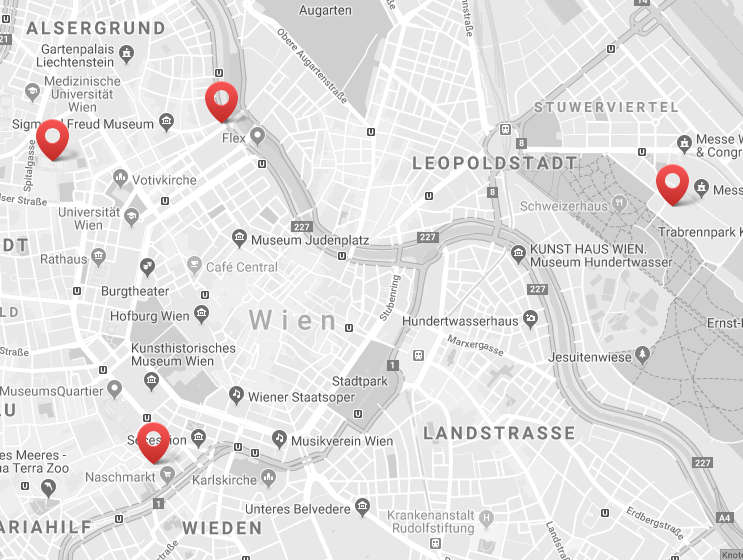
Travel
Plane
The international airport Vienna – Flughafen Wien Schwechat – is located approximately 20 km south-east from the City Center. You can get there by:
Taxis are available right in front of the arrival and departure hall.
Train
Vienna is well connected to the international rail network. International trains arrive either at Wien Hauptbahnhof or Wien Westbahnhof. From there you can take the underground, buses and/or trams. For more information please contact +43 05-1717 or use the following link:
Public transport
In Vienna you can use the underground, busses, trams and S-Bahn (train). You can purchase tickets at the airport, at any metro-station and at tobacco shops.
Accommodation
For our participants we pre-booked some hotels near the conference venues. For all bookings please use/state the booking-code: KNOWEX2018. All hotels will then provide you with a pre-booked room, if still available. We recommend booking early.
Hotel Boltzmann ****
Within walking distance of the conference facilities of the first conference day as well as to the historical city center, the Hotel Boltzmann Vienna welcomes you in an absolutely quiet and cosy ambience. Pre-booked rooms are available from 27 to 29 September 2018. For reservation please write to the linked e-mail address using the booking-code given above.
Hotel Motel One Wien-Prater ****
Motel One Wien-Prater is right next to the Prater, at the heart of the Leopoldstadt district and also close to the Vienna University of Economics and Business, host of the second conference day. For booking you can use the reservation form and send it directly to the following link.
For all questions related to the conference, please contact: conference@wtz-ost.at
